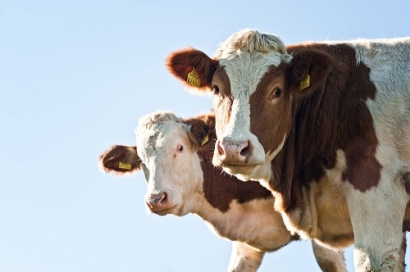
Studying the digestive systems of ruminants (mammals that are able to acquire nutrients from plant-based food by fermenting it in a specialized stomach prior to digestion ) like cows, sheep, and even reindeer may help scientists uncover more efficient and environmentally friendly ways to process waste and generate energy, as well as improve our understanding of ruminant nutrition.
Using detailed information about the molecular biology of switchgrass and corn stover—both widely used to create biofuels—the scientists identified a previously unknown family of bacteria found in both cows and sheep.The family of bacteria discovered in this study appears to actively degrade plant biomass in the stomachs of ruminants using complex enzymes different from those already well known to scientists. Understanding these bacteria could help scientists design animal feeding strategies and commercial systems for biofuels and waste management
The team described a family representative found in the rumen of two cows. Data gathered using EMSL’s Orbitrap mass spectrometer helped scientists realize the population of bacteria was metabolically active in the rumen. In both the feedstock and the cows, the bacteria secreted multi-modular enzymes believed to be very powerful in biomass conversion. The metabolism and abundance of these bacteria indicate they may play an important role in allowing ruminants, and commercial processes, to deconstruct biomass.
Team members included researchers from the Norwegian University of Life Sciences; the Ohio State University; EMSL, the Environmental Molecular Sciences Laboratory, a DOE Office of Science user facility; Germany’s Helmholtz Centre for Infection Research; the University of Illinois, Urbana-Champaign; University of Michigan Medical School; and University of California, Davis.
This work was supported by the U.S. Department of Energy’s Office of Science (Office of Biological and Environmental Research), including support of the Environmental Molecular Sciences Laboratory (EMSL) and the Advanced Photon Source, both DOE Office of Science user facilities, as well as the European Research Council.
(Information provided by Environmental Molecular Sciences Laboratory)

